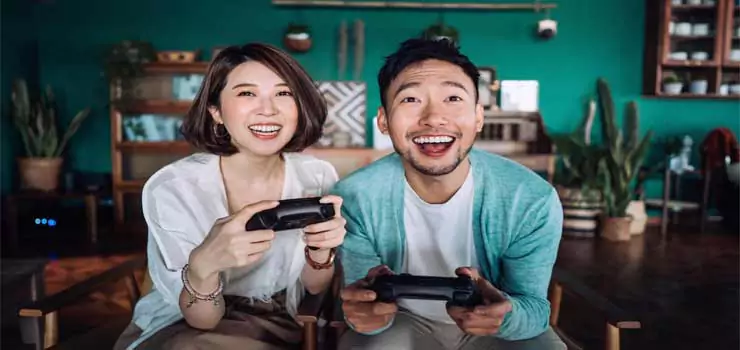Table of Contents
In the age of ubiquitous technology, video games have become an undeniable cultural force. While often associated with entertainment, they possess a surprising hidden potential – the ability to enhance various skills that benefit us in different aspects of life. This article delves into how the world of games can become a training ground for developing crucial life skills, from cognitive abilities to social interaction, and how to harness this potential responsibly for self-improvement.

The Training Ground: Games as Skill-Building Platforms
Games, by their very nature, present challenges and obstacles that require players to adapt, strategize, and overcome. This inherent structure creates a safe and controlled environment where individuals can experiment, learn, and master various skills without facing real-world consequences for mistakes. Unlike passive forms of entertainment like watching television, games demand active engagement, putting players in the driver’s seat of their learning journey.
One of the most prominent benefits of gaming is the development of cognitive skills. Strategy games, for instance, require players to think critically, plan several steps, and anticipate the actions of their opponents. These challenges constantly test and improve problem-solving abilities, decision-making skills, and critical thinking. Puzzle games, on the other hand, hone logical reasoning, spatial awareness, and pattern recognition. Every challenge overcome in a game is a step towards sharpening these valuable cognitive tools.
Read this article for Top Best Laptops with RTX 4090 for Gamers in 2024
From Pixels to Reality: Transferring Skills to Everyday Life
However, the benefits of gaming extend beyond the virtual world. The skills honed in the digital arenas can be surprisingly transferable to real-life situations. The problem-solving skills honed in tactical RPGs can translate to finding creative solutions to academic problems or devising effective strategies in professional settings. The lightning-fast decision-making field in real-time strategy games can manifest as increased situational awareness and adaptability in everyday life.
Games have a surprising potential to foster social skills as well. Online multiplayer games, especially those requiring collaboration and teamwork, necessitate effective communication, coordination, and leadership skills. Players learn to communicate clearly, strategize collectively, and work towards a common goal, fostering a sense of teamwork and camaraderie. These skills directly translate into real-world interactions, enhancing individuals’ ability to collaborate effectively in group projects, manage team dynamics, and build strong interpersonal relationships.

Beyond cognitive and social skills, games can also nurture personal development. Many games cultivate creativity and resourcefulness by requiring players to think outside the box and utilize available resources uniquely. This imaginative thinking can translate into finding innovative solutions to real-world problems and adapting to unexpected challenges. Additionally, overcoming complex in-game challenges fosters resilience and the ability to learn from mistakes, crucial qualities for personal growth and overcoming obstacles in life.
Finding the Right Balance: Responsible Gaming for Skill Development
It’s crucial to acknowledge that the benefits of gaming come with important caveats. While games can be powerful tools for skill development, excessive or unbalanced gameplay can lead to negative consequences like neglecting responsibilities, social isolation, and even health issues. Therefore, it’s vital to emphasize the importance of responsible gaming practices.
Also Read: Explore the Best PC Survival Games Now in 2024
Maintaining a healthy balance is critical. It involves setting time limits for gaming, ensuring it doesn’t interfere with other essential aspects of life like studies, work, or social interaction. Additionally, it’s necessary to be mindful of content and choose games that align with personal values and contribute positively to skill development. Parents and educators can play a crucial role by guiding individuals towards responsible gaming and encouraging participation in other activities that promote holistic development.
Conclusion: Level Up Your Life with Games
Video games, often dismissed as mere entertainment, offer a surprising opportunity for skill development and personal growth. They provide a dynamic platform for honing cognitive abilities like problem-solving and decision-making, fostering social skills like communication and teamwork, and nurturing unique qualities like creativity and resilience. By adopting a responsible and balanced approach, we can harness the power of games to level up our skills and unlock a pathway to personal and professional success. Remember, it’s not just about digital victories; it’s about applying the skills learned in the virtual world to conquer challenges and achieve success in the real world. So, keep visiting londonbtimes, pick up the controller, choose wisely, and prepare to improve your life!

FAQs: Level Up Your Life: How Games Can Enhance Your Skills
Q: What are the benefits of playing video games?
A: Games can enhance various skills, including:
- Cognitive skills: Problem-solving, decision-making, critical thinking, spatial awareness, and pattern recognition.
- Social skills: Communication, collaboration, teamwork, and leadership.
- Personal development: Creativity, resourcefulness, resilience, and learning from mistakes.
Q: Can any type of game improve my skills?
A: Different game genres focus on different skills.
- Strategy games: Problem-solving, planning, and critical thinking.
- Puzzle games: Logical reasoning, spatial awareness, and pattern recognition.
- Multiplayer games: Communication, collaboration, teamwork, and leadership.
- Open-world games: Creativity, resourcefulness, and problem-solving in diverse scenarios.
Q: Is there a downside to playing video games?
A: Excessive or unbalanced gaming can lead to:
- Neglecting responsibilities: Studies, work, or social interaction.
- Social isolation: Neglecting real-world relationships.
- Health issues: Sleep disturbances, eye strain, or even addiction in extreme cases.
Q: How can I play games responsibly?
- Set time limits: Ensure gaming doesn’t interfere with other priorities.
- Choose games wisely: Select games that align with your values and contribute to skill development.
- Maintain a balanced lifestyle: Engage in different activities for holistic development.
Q: Can games replace other forms of learning and development activities?
A: No. While games offer valuable skill-building opportunities, they should complement, not replace, other learning and development activities like education, physical activity, and social interaction.




